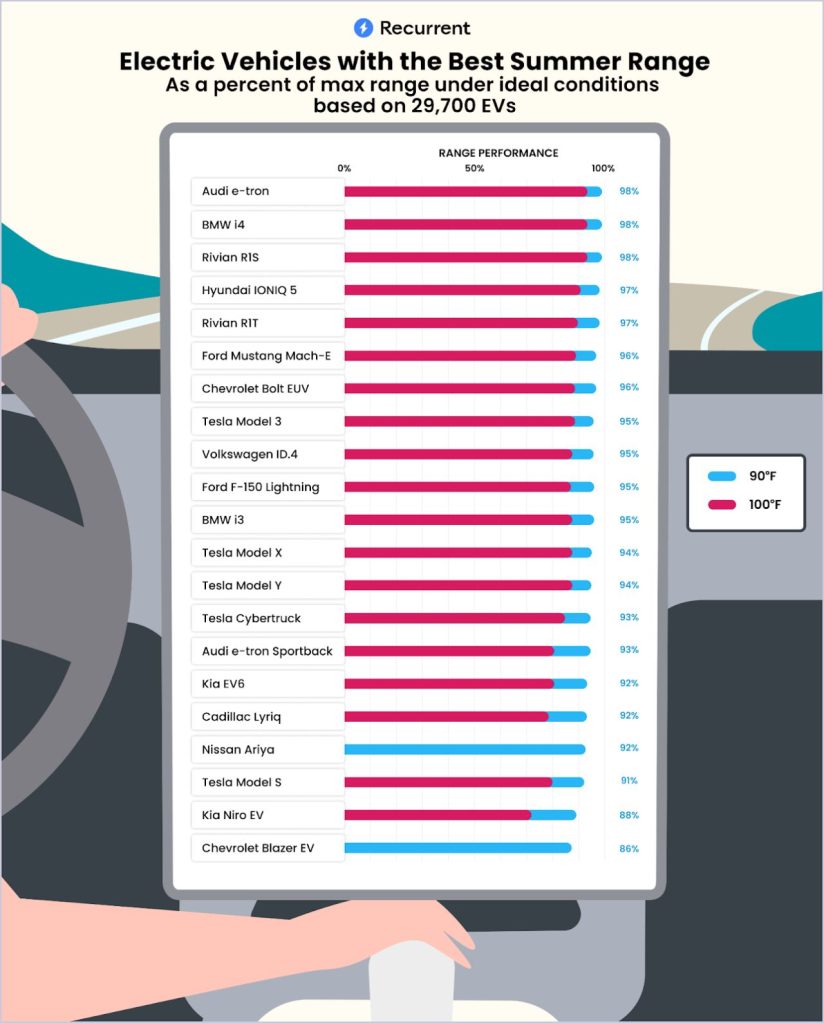
With much of the US sweltering under a record-breaking heat dome, many EV buyers and owners are left wondering how their favorite electric cars perform in extreme summer temperatures. A new study tracking over 29,700 electric cars in real-world conditions provides the answers, and we’re sharing them here: these are the EVs that handle the summer heat best.
The EV leasing and subscription specialists Recurrent Auto have had tens of thousands of new and used EVs in their database over the years, giving them a massive dataset to analyze and draw conclusions from. So when they published their findings about which EVs had the best range in 90- and 100-degree weather, it was required reading for any would-be EV expert.
“Most of the country has a heat advisory right now, so we’re fielding lots of questions about EV batteries in extreme heat,” reads the intro to the Recurrent report. “Here’s the deal … electric cars work perfectly fine in hot weather. Range loss at 90F (32C) is minimal. Less than 5% change.”
Like many real-world aspects of EV ownership and longevity, that seems a lot better than what most people – or even most analysts would likely tell you. So, what gives?
“When temperatures pass 100F (37C), range impacts can be 17-18%,” they continue, “but these reductions are temporary while the AC is working to keep passengers cool … we advise that owners and dealerships avoid letting an EV sit with extremely low states of charge in this heat. An EV uses its battery power to keep the battery cool.”
The infographic

Recurrent’s findings put the Audi e-tron in the top spot, followed closely by recent JD Power favorites BMW i4 and Rivian R1S, all of which reportedly lose less than 3% of their range, even at an absolutely blistering 100°F.
To put those percentages into some easier to digest numbers (and fix the fact that Recurrent’s infographic makes it look, to my eyes, like you can’t drive a Nissan Ariya or Chevy Blazer at 100+ degrees), I’ve done the math, starting with the EV’s EPA-rated range under “ideal” conditions, then translated that using the percentages from Recurrent.
Would I bet my family’s safety and convenience on this rough-and-tumble chart while planning my next road trip? Absolutely not – go download Chargeway for that. Would I do the math because it’s a fun mental exercise that’s going to generate fun comments? Absolutely.
Check out the math, below, and if you see an EV you like in there click on the link in the table to go find a great local deal on a hot weather ready electric car near you. Links to Rivian and Tesla dealers weren’t included because they don’t have dealers.
EV range in extreme heat
SOURCES: Recurrent Auto, via LinkedIn; featured image via Audi.

If you’re considering going solar, it’s always a good idea to get quotes from a few installers. To make sure you find a trusted, reliable solar installer near you that offers competitive pricing, check out EnergySage, a free service that makes it easy for you to go solar. It has hundreds of pre-vetted solar installers competing for your business, ensuring you get high-quality solutions and save 20-30% compared to going it alone. Plus, it’s free to use, and you won’t get sales calls until you select an installer and share your phone number with them.
Your personalized solar quotes are easy to compare online and you’ll get access to unbiased Energy Advisors to help you every step of the way. Get started here.
FTC: We use income earning auto affiliate links. More.












